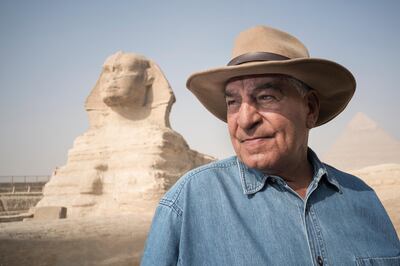Egypt’s former minister of antiquities, Zahi Hawass, has completed a script for an opera based on the life of the world’s most famous pharaoh: Tutankhamun. It will be performed at the opening of the Grand Egyptian Museum in Cairo late next year.
Hawass spoke about his new creation, which was announced at a press conference in Vienna in September, at the launch of Tutankhamun: Treasures of the Golden Pharaoh. This new exhibition opened on Saturday at England's Saatchi Gallery and will run until May 3, 2020, the proceeds for which will go towards supporting the new museum in Egypt.
"When you write a script for an opera, you do not need to [adhere] 100 per cent to history, because history is boring," he said at the event, according to The Art Newspaper. "You need to bring the feeling."
The opera has been co-written by Hawass and Francesco Santocono, with the music composed by Italian musician Lino Zimbone. The first performance will mark the launch of the much-awaited new museum, which is also known as the Giza Museum. Hawass said it would be "nice to stage it also in the west Valley of the Kings in 2022", as November 4 that year will be the 100th anniversary of Egyptologist Howard Carter's discovery of the Boy King's tomb.
Hawass, who also wrote the complementary book for London's Tutankhamun exhibition, says the storyline of the opera will focus on the death of Tut's father King Akhenaten, as well as elements of the life and 10-year reign of the pharaoh – in particular, his ascension to the throne.
One scene will retell Queen Nefertiti's attempt to murder Tutankhamun, Hawass said. The wife of Pharaoh Akhenaten had six daughters, but no daughter could be king of Egypt. When the new wife of Akhenaten had a baby boy, Nefertiti was upset. So she called in an evil priest who told her the only thing she could do was have Tutankhamun killed.
Another scene indicates that Nefertiti came to power after Akhenaten’s death, but was poisoned by another woman in the harem. The performance will also recount King Tut’s coronation and his untimely, unexpected death at the tender age of 19 in about 1324 BC.
Hawass previously said he was inspired to write the production upon learning that famed Egyptian opera Aida by Giuseppe Verdi is now 148 years old.



